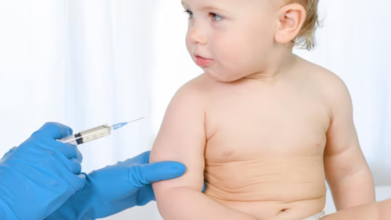- Health Conditions A-Z
- Health & Wellness
- Nutrition
- Fitness
- Health News
- Ayurveda
- Videos
- Medicine A-Z
- Parenting
- Web Stories

Vaccines For Infants (Credit-Freepik)
What Vaccines At One to Two Months Will Your Baby Get?
Babies are the true miracle of life. But they require a lot of protection when they are new to the world. When babies are born, their immune system is still not fully developed and even a simple cold can be life-threatening to them. It is always recommended to get their babies vaccinated. Some vaccines are administered as soon as 24 hours after birth. While this is an exciting time in a parent's life to have a new life around them, their vaccinations can save them from unknowing diseases that may creep into their systems that could exist in the mother’s body and get passed down to the child’s body.
Hepatitis B (HepB)
Hepatitis B is an infectious and potentially serious disease that can cause liver damage and even liver cancer. There is no cure for Hepatitis B. Sometimes mothers can unknowingly pass the hepatitis B virus to their babies, and to counter this, the first dose of the Hepatitis B virus has to be administered within 24 hours. If the parent knows they have Hepatitis B then the first dose can be done after 12 hours of birth along with additional medicines that will give your child an extra shield of protection from Hepatitis B Immune Globin (HBIG). This basically gives the child a boost to fight the virus as soon as it is born.
Respiratory Syncytial Virus
This is a common and severe respiratory illness in infants and young children. If your child contracts this, you will see them struggling to breathe and eat, you may also need to go to respiratory support at the hospital. Your child will also need hydration as during this time your child can get severely dehydrated. The counter product of RSV uses monoclonal antibodies that immunize your child against RSV disease. If your child is below eight months during the RSV season, then you must get at least one shot to protect them. The following shot should be given shortly after.
DTaP for diphtheria, tetanus, and whooping cough
There's a special shot called DTaP that protects against three very serious illnesses: diphtheria, tetanus, and whooping cough. These diseases can be dangerous for anyone, but especially for babies. Getting the DTaP shot is the best way to stay safe from them.
Haemophilus influenzae type b disease
There's a germ called Hib that can make babies and young children very sick. It can cause serious problems like brain infections, lung problems, and even death. Doctors recommend getting your child vaccinated with the Hib vaccine to protect them from this dangerous germ. Depending on the type of vaccine, your child might need 3 or 4 doses.
Pneumococcal disease
This can cause serious infections, including pneumonia. It's called pneumococcal bacteria. Luckily, there's a vaccine called the pneumococcal conjugate vaccine that helps protect against these infections.
Polio
Polio is a serious illness that can make it hard to walk or even move at all. It's caused by a germ called poliovirus and mostly affects young children. Thanks to vaccines, polio has been eliminated in the United States, meaning we don't have to worry about it anymore.
Rotavirus
This virus called rotavirus makes babies and young children very sick, sometimes even causing death. To protect them, doctors recommend getting the Rotavirus vaccine. Depending on the type of vaccine, your child might need 2 or 3 doses.
Vaccine aftercare
You must pay extra attention to your child following the vaccine administration. If you are a new parent, do not feel shy about contacting your doctor if you see something concerning. Your doctor will give you a ‘Vaccine Information Sheet’ that will help you see the side effects that your baby may experience. If you feel slightly concerned you can check the sheet and cross-check the rest with your healthcare provider.
Your child may also need more energy after the vaccination, so make sure to feed them more during this time. They tend not to eat after getting vaccines so make this a priority.
If your child is having a mild reaction to the vaccine then you do not need to worry, these are normal reactions and will soon go away. Use a cool, damp cloth to help reduce redness and swelling from the injection. If your baby is experiencing a fever from the injection, then dab them with a cool sponge bath. You can ask the doctor to give you a baby non-aspirin pain reliever.

Credits: Canva
Mood Disorders In Kids, Teens Have Increased: Why Are Children Struggling Emotionally?
Not so long ago, childhood was seen as a joyful chapter of life rich with play, discovery, and endless imagination but now, a dangerous shift is underway. More and more number of children and teens are fighting severe emotional struggles that were once considered rare in youth. From depression and anxiety to more serious, more intricate mood disorders, the emotional well-being of the next generation is in shambles.
A study appearing recently in JAMA Pediatrics put a spotlight on a frightening trend: a sharp and consistent rise in mood disorders in children and teenagers over the last six years. Over 1 in 10 kids—10.6%—suffered from anxiety in 2022, compared to 7.1% in 2016. Depression also increased, hitting 4.6% of children in 2022, up from 3.2% in 2016. These statistics are not abstract; they reflect an escalating emotional crisis among our children, one that requires immediate and thoughtful action from parents, medical professionals, educators, and policymakers.
These aren't one-time occurrences. They're indicators of a broader crisis that is occurring in schools, homes, and communities—one which was fueled by the pandemic but was well under way before that. As the stressors of childhood change and escalate, so does the psychological load on our children.
But whereas scraped knees or the flu are tangible and obvious, mood disorders can be intangible, misunderstood, or dismissed altogether. And if left unidentified or unaddressed, the impact can trail a child into adolescence and adulthood, impacting everything from grades to relationships, self-worth, and health outcomes.
Not Just a Post-Pandemic Phenomenon
Although the COVID-19 pandemic shed international light on mental health conditions, scientists explain that the increased prevalence of mood disorders among adolescents is not exclusively a pandemic phenomenon. "Our results highlight the urgent need to address youth mental health, which continued to decline even as we exited the pandemic," says Marie Heffernan, assistant professor of pediatrics at Northwestern University Feinberg School of Medicine.
The research, conducted on the National Survey of Children's Health, shows a bittersweet pattern: although a few physical medical issues such as asthma and migraine are reducing in numbers, mental and emotional ailments are increasing. This contrast serves to emphasize that children's emotional health must command just as much clinical attention as does their bodily well-being.
What Are Mood Disorders?
Mood disorders, or affective disorders, are mental illnesses that encompass major depression, bipolar disorder, and dysthymia. They are marked by disturbances in an individual's emotional state that exceed the normal ups and downs of childhood or adolescence. The emotional changes are persistent, intense, and hard to control, and they tend to interfere with a child's functioning at home, school, and in social relationships.
Some of the most frequently diagnosed mood disorders in children and adolescents are:
Major Depressive Disorder: Ongoing sadness or irritability for two weeks or more.
Persistent Depressive Disorder (Dysthymia): Ongoing low-grade depression for one year or more.
Bipolar Disorder: Intermittent periods of elevated and depressed mood.
Disruptive Mood Dysregulation Disorder (DMDD): Intense irritability and persistent outbursts of temper.
Substance-Induced Mood Disorder: Mood disturbances due to medication, drugs, or toxins.
Mood Disorders Caused by Medical Illnesses: Mood shifts brought on by chronic disease or injury.
How to Identify the Warning Signs
In contrast to adults, children and adolescents tend to convey emotional distress through physical complaints or behavioral problems instead of talking about sadness or anxiety. This can make it more difficult to identify mood disorders. The Children's Hospital of Philadelphia states that symptoms can be:
- Severe or persistent sadness, irritability, or anger
- Substantial changes in sleep, appetite, or energy
- Withdrawal from friends or family, or withdrawal from social events
- No interest or pleasure in activities that they used to enjoy
- Difficulty with schoolwork without an identifiable cause
- Excessive physical complaints such as headaches or stomachaches
More often than not, these symptoms are confused with "phases" or attributed to stress or personality traits. That diagnostic delay can result in escalating symptoms or the emergence of comorbid conditions such as substance abuse or conduct disorders.
Why Are Today's Kids More Vulnerable Emotionally?
Experts cite several overlapping reasons for the explosion of mood disorders in young people:
Heightened Academic and Social Stress: Children today are under enormous pressure to succeed—academically, athletically, and socially—with little time left for emotional regulation.
Social Media and Online Exposure: Ongoing exposure to filtered realities, cyberbullying, and online validation cycles can exacerbate feelings of inadequacy and anxiety.
Family Life and Stress: Domestic instability, economic struggles, or family conflict can have a significant effect on a child's emotional resilience.
Deficiencies in Mental Health Infrastructure in Schools: Most schools do not have adequate psychological support staff or school programs emphasizing emotional well-being.
Stigma and Lack of Awareness: Mental health, in most communities, is still stigmatized, and its underreporting and underdiagnosis follow accordingly.
Managing Mood Disorders with Early Intervention
Mood disorders in children can be treated—if caught early. Treatments include:
- Cognitive Behavioral Therapy (CBT) to assist in coping with detrimental thought patterns in children
- Medication, as needed and very closely monitored
- Family Therapy to treat systemic stressors
- School-Based Support Services, including counseling and emotional wellness programs
Experts have said that continued concern and resources are justified at a national level to explain and treat the array of possible reasons for increasing anxiety and depression.
What Can Parents and Schools Do?
The awareness is the beginning, parents need to notice not only the changes in behaviour, but also emotional and physical signals that indicate distress. Schools, in return, require improved mental health education for teachers and more accessible support systems for pupils.
Promoting open dialogue about mental health, safe emotional release, and decreasing stigma can help children get through their feelings. As has been proven through research, numerous children benefit immensely from early, long-term intervention—and go on to live strong, healthy lives.
The emotional well-being of our children is not a specialty concern—it's a global public health imperative. With anxiety and depression levels steadily increasing, the time to take action is now. Being able to provide children with the proper resources, attention, and support systems can influence not only their emotional well-being in the short term but their capacity to thrive in the future.

Credits: Canva
Why 'The Talk' Is Not An Easy Topic For Parents?
The Talk. If you are an adult, a parent, or in your early adulthood, you must have heard about "The Talk". This conversation, as important as it is to have, could also be anxiety inducing.
What Exactly Is "The Talk"?
The question that may loom over parents is when is it the right age to have "The Talk"? But, before we get to that, let us discuss what "The Talk" is?
By "The Talk", people mean to drop the bomb, or address the elephant in the room. This conversation involves talking to your kids about puberty that will bring about many changes in their bodies, their minds, how they fell, and much more.
"The Talk" is not just one conversation that can happen only once in your life. It is an on-going discourse. However, having "the Talk" at least once, sets the foundation for kids and tells them that they can reach out to their parents whenever they wish to.
As per the CS Mott Children's Hospital National Poll on Children's Health, about 41% of parents reported that they approached talking with their child about puberty only when prompted by child. Only 36% of parents think it is best to have this conversation before the age of 10. So, what is the right age?
If experts are to be believed, it is best to bring this conversation up before your child brings it to you.
However, it is an anxiety-inducing process. But why is this important to talk?
“It’s easy to assume a child is too young for conversations about puberty, but many parents are surprised to find their tween already showing signs,” said Sarah Clark, Mott Poll Co-Director.
Early discussions, she explains, allow parents to present the information in an age-appropriate way, easing confusion and anxiety. If parents don’t begin the conversation, kids may seek answers from classmates, social media, or television.
Different Approaches, Different Comfort Levels
The poll revealed a wide range of parental approaches:
Proactive Parents: About half said they start conversations before questions arise.
Reactive Approach: Two in five wait until their child brings it up.
Avoidance: Around 5% avoid the topic altogether.
Many parents feel uneasy: one in five worry about embarrassment, and one in six fear saying the wrong thing. Some children resist as well—25% of parents with 10- to 12-year-olds say their child doesn’t want to talk about puberty, and a third of parents with 7- to 9-year-olds feel their child is too young to understand.
Parental History Shapes Comfort
Parents' past experiences with “The Talk” also play a role. Fewer than one in three received adequate information from their own parents. More than a third never had the conversation at all.
“Whether they realize it or not, parents may bring their own childhood experiences into how they handle this now,” Clark noted.
Navigating Topics of Sex and Reproduction
Another common challenge: knowing whether to include discussions about sex and reproduction, and if so, how much to share. Clark advises starting with the basics—physical and emotional changes—then layering in more detail over time.
Confidence in spotting puberty varies. About half of parents say they can recognize signs of puberty, and 60% of parents with 10- to 12-year-olds say they’ve already seen them. Among parents of younger children (ages 7–9), 17% have noticed early signs, while nearly a third remain unsure what to look for.

Credits: Canva
What To Do When Your Child Has A Concussion?
When a child takes a tumble and hits their head, it is quite natural for a parent to panic. While many of these falls are harmless, in fact, a part of growing up, a blow to the head could sometimes result in a concussion. A concussion could be a mild traumatic brain injury (TBI) that needs attention and care.
Here is what you can do if your child experiences concussions. However, before we get into what to do, let us first understand what exactly is a concussion.
What Is A Concussion?
It is a type of mild TBI that usually occurs after a sudden impact to the head, face, neck, or just any part of the body that causes brain to move rapidly inside the skull. It can happen with or without the loss of consciousness. There are symptoms that could appear immediately or take a few hours to surface. However, these concussions typically resolves within a few days or weeks.
How To Know If Your Child Has a Concussion?
If your child ever receives a blow to the head, be on the lookout for these following symptoms:
- Persistent headaches
- Confusion or disorientation
- Difficulty remembering things
- A blank stare or dazed look
- Trouble following instructions
- Slurred or slow speech
- Dizziness or loss of balance
- Vomiting
- Emotional changes (crying, laughing inappropriately, irritability, sadness)
However, these symptoms may vary from child to child. While some may have subtle symptoms, others may show immediate symptoms. It is advisable for parents to be on the lookout.
How Do Kids Get Concussions?
While any hit to the head or face can cause a concussion, most concussions in children are linked to high-impact sports. Common activities associated with concussions include:
- Football
- Soccer
- Ice hockey
- Lacrosse
- Basketball
- Rugby
- Wrestling
Even playground accidents, cycling, or slipping on stairs can lead to a concussion.
How Are Concussions Diagnosed?
Concussions are diagnosed clinically through observation, physical exams, and standardized tests conducted by trained healthcare providers such as doctors or athletic trainers. There are no blood tests or imaging scans (like MRIs or CT scans) that can definitively diagnose a concussion.
What Are The Treatment Options?
The key is to rest, both mentally and physically.
Usually, after a concussion, acetaminophen or ibuprofen is given for headaches. However, the dosage may change if it is being prescribed for a child. It is best to always seek advice from a doctor rather than self-medicating. Encourage your child to follow a healthy diet, with plenty of water. Ensure that your child gets extra rest and sleep. However, light and gradual activity is okay. It is best to avoid bright lights, loud sounds, and screen time while your child is still in the early stage of recovery. The best thing is to stick to a routine that will help your child feel stable and secure.
Some doctors also recommend intake of B-complex vitamins and magnesium supplements, which could also help with headache relief. However, it is also best to consult a doctor before you introduce any supplements to your child.
© 2024 Bennett, Coleman & Company Limited

